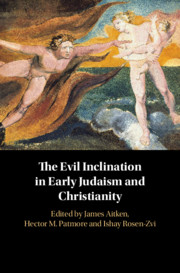Book contents
- The Evil Inclination in Early Judaism and Christianity
- The Evil Inclination in Early Judaism and Christianity
- Copyright page
- Contents
- Acknowledgments
- Contributors
- 1 Introduction
- 2 Reconsidering the Semantics of the “Inclination” (yeṣer) in Classical Biblical Hebrew
- 3 The “Inclination” (yeṣer) as Rendered in the Septuagint
- 4 “Fleshly Spirit” and “Vessel of Flesh” in 4QInstruction and the Thanksgiving Hymns
- 5 Theological Anthropology in the Enochic Tradition
- 6 The Perils of Philosophical Persuasion: Philo on the Origin of Moral Evils
- 7 The Evil Inclination (yeṣer ha-ra‘) in Tannaitic Literature: Demonic Desires and Beyond
- 8 Conflicting Intrapersonal Powers in Paul’s Letters
- 9 The “Two Inclinations” and the Double-Minded Human Condition in the Letter of James
- 10 An Evil Inclination in the Early Targums to the Pentateuch and Prophets?
- 11 “Gnostic” Theologies of Evil
- 12 The Rabbinic “Inclination” (yeṣer) and the Christian Apocrypha
- 13 Origen on the Origin of Sin
- 14 Augustine on the Diabolical Suggestion of Sin
- 15 Jerome and the “Inclination” (yeṣer): The Evidence of the Vulgate
- 16 Rabbinic Inclinations and Monastic Thoughts: Evagrius Ponticus’ Doctrine of Reasoning (logismoi) and Its Antecedents
- 17 “Inclination” (yaṣrā) in the Syriac Tradition
- 18 Evil, Sin, and Inclination (yeṣer) in Jewish and Christian Poetic Disputes between the Body and Soul
- 19 The Wizard of Āz and the Evil Inclination: The Babylonian Rabbinic Inclination (yeṣer) in Its Zoroastrian and Manichean Context
- 20 The Evil Inclination in the Targums to the Writings
- References
- Index of Names
- Index Locorum
11 - “Gnostic” Theologies of Evil
Published online by Cambridge University Press: 02 February 2021
- The Evil Inclination in Early Judaism and Christianity
- The Evil Inclination in Early Judaism and Christianity
- Copyright page
- Contents
- Acknowledgments
- Contributors
- 1 Introduction
- 2 Reconsidering the Semantics of the “Inclination” (yeṣer) in Classical Biblical Hebrew
- 3 The “Inclination” (yeṣer) as Rendered in the Septuagint
- 4 “Fleshly Spirit” and “Vessel of Flesh” in 4QInstruction and the Thanksgiving Hymns
- 5 Theological Anthropology in the Enochic Tradition
- 6 The Perils of Philosophical Persuasion: Philo on the Origin of Moral Evils
- 7 The Evil Inclination (yeṣer ha-ra‘) in Tannaitic Literature: Demonic Desires and Beyond
- 8 Conflicting Intrapersonal Powers in Paul’s Letters
- 9 The “Two Inclinations” and the Double-Minded Human Condition in the Letter of James
- 10 An Evil Inclination in the Early Targums to the Pentateuch and Prophets?
- 11 “Gnostic” Theologies of Evil
- 12 The Rabbinic “Inclination” (yeṣer) and the Christian Apocrypha
- 13 Origen on the Origin of Sin
- 14 Augustine on the Diabolical Suggestion of Sin
- 15 Jerome and the “Inclination” (yeṣer): The Evidence of the Vulgate
- 16 Rabbinic Inclinations and Monastic Thoughts: Evagrius Ponticus’ Doctrine of Reasoning (logismoi) and Its Antecedents
- 17 “Inclination” (yaṣrā) in the Syriac Tradition
- 18 Evil, Sin, and Inclination (yeṣer) in Jewish and Christian Poetic Disputes between the Body and Soul
- 19 The Wizard of Āz and the Evil Inclination: The Babylonian Rabbinic Inclination (yeṣer) in Its Zoroastrian and Manichean Context
- 20 The Evil Inclination in the Targums to the Writings
- References
- Index of Names
- Index Locorum
Summary
The second century CE saw the rise of the first wave of speculative Christian theologies. Leading thinkers in this group, such as Valentinus, Ptolemaeus, Marcion, and Basilides – working in cultural centers like Alexandria, Antioch, and Rome – sought to address some of the core theological quandaries of their day such as the nature of creation, emergent Christianity’s relationship to its Jewish heritage, and the origin of evil – issues which are all inextricably linked. Unlike their later proto-orthodox rivals who would seek the genesis of wickedness in the movements of the human will, members of the first wave opted for largely metaphysical solutions to the problem of evil. As such, these thinkers had a very different understanding of cosmology and anthropology than their rivals who eventually sidelined them as purveyors of “false gnosis” and heresy.
- Type
- Chapter
- Information
- The Evil Inclination in Early Judaism and Christianity , pp. 176 - 185Publisher: Cambridge University PressPrint publication year: 2021



